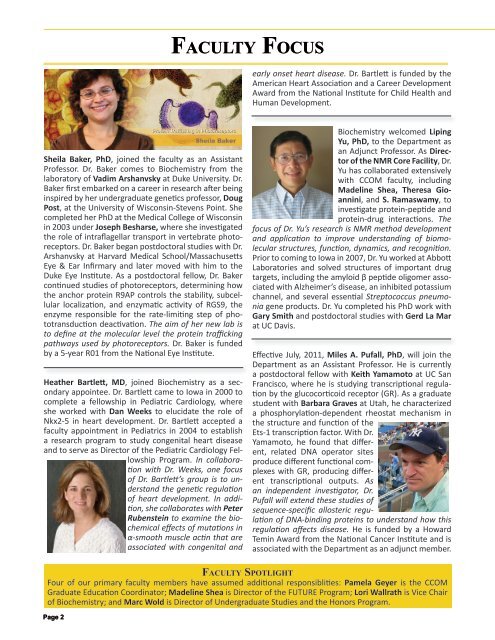2010 Biochemistry Newsletter - Department of Biochemistry ...
2010 Biochemistry Newsletter - Department of Biochemistry ...
2010 Biochemistry Newsletter - Department of Biochemistry ...
Create successful ePaper yourself
Turn your PDF publications into a flip-book with our unique Google optimized e-Paper software.
Sheila Baker, PhD, joined the faculty as an Assistant<br />
Pr<strong>of</strong>essor. Dr. Baker comes to <strong>Biochemistry</strong> from the<br />
laboratory <strong>of</strong> Vadim Arshanvsky at Duke University. Dr.<br />
Baker first embarked on a career in research after being<br />
inspired by her undergraduate genetics pr<strong>of</strong>essor, Doug<br />
Post, at the University <strong>of</strong> Wisconsin-Stevens Point. She<br />
completed her PhD at the Medical College <strong>of</strong> Wisconsin<br />
in 2003 under Joseph Besharse, where she investigated<br />
the role <strong>of</strong> intraflagellar transport in vertebrate photoreceptors.<br />
Dr. Baker began postdoctoral studies with Dr.<br />
Arshanvsky at Harvard Medical School/Massachusetts<br />
Eye & Ear Infirmary and later moved with him to the<br />
Duke Eye Institute. As a postdoctoral fellow, Dr. Baker<br />
continued studies <strong>of</strong> photoreceptors, determining how<br />
the anchor protein R9AP controls the stability, subcellular<br />
localization, and enzymatic activity <strong>of</strong> RGS9, the<br />
enzyme responsible for the rate-limiting step <strong>of</strong> phototransduction<br />
deactivation. The aim <strong>of</strong> her new lab is<br />
to define at the molecular level the protein trafficking<br />
pathways used by photoreceptors. Dr. Baker is funded<br />
by a 5-year R01 from the National Eye Institute.<br />
Heather Bartlett, MD, joined <strong>Biochemistry</strong> as a secondary<br />
appointee. Dr. Bartlett came to Iowa in 2000 to<br />
complete a fellowship in Pediatric Cardiology, where<br />
she worked with Dan Weeks to elucidate the role <strong>of</strong><br />
Nkx2-5 in heart development. Dr. Bartlett accepted a<br />
faculty appointment in Pediatrics in 2004 to establish<br />
a research program to study congenital heart disease<br />
and to serve as Director <strong>of</strong> the Pediatric Cardiology Fellowship<br />
Program. In collaboration<br />
with Dr. Weeks, one focus<br />
<strong>of</strong> Dr. Bartlett’s group is to understand<br />
the genetic regulation<br />
<strong>of</strong> heart development. In addition,<br />
she collaborates with Peter<br />
Rubenstein to examine the biochemical<br />
effects <strong>of</strong> mutations in<br />
α-smooth muscle actin that are<br />
associated with congenital and<br />
Page 2<br />
Faculty Focus<br />
early onset heart disease. Dr. Bartlett is funded by the<br />
American Heart Association and a Career Development<br />
Award from the National Institute for Child Health and<br />
Human Development.<br />
<strong>Biochemistry</strong> welcomed Liping<br />
Yu, PhD, to the <strong>Department</strong> as<br />
an Adjunct Pr<strong>of</strong>essor. As Director<br />
<strong>of</strong> the NMR Core Facility, Dr.<br />
Yu has collaborated extensively<br />
with CCOM faculty, including<br />
Madeline Shea, Theresa Gioannini,<br />
and S. Ramaswamy, to<br />
investigate protein-peptide and<br />
protein-drug interactions. The<br />
focus <strong>of</strong> Dr. Yu’s research is NMR method development<br />
and application to improve understanding <strong>of</strong> biomolecular<br />
structures, function, dynamics, and recognition.<br />
Prior to coming to Iowa in 2007, Dr. Yu worked at Abbott<br />
Laboratories and solved structures <strong>of</strong> important drug<br />
targets, including the amyloid β peptide oligomer associated<br />
with Alzheimer’s disease, an inhibited potassium<br />
channel, and several essential Streptococcus pneumonia<br />
gene products. Dr. Yu completed his PhD work with<br />
Gary Smith and postdoctoral studies with Gerd La Mar<br />
at UC Davis.<br />
Effective July, 2011, Miles A. Pufall, PhD, will join the<br />
<strong>Department</strong> as an Assistant Pr<strong>of</strong>essor. He is currently<br />
a postdoctoral fellow with Keith Yamamoto at UC San<br />
Francisco, where he is studying transcriptional regulation<br />
by the glucocorticoid receptor (GR). As a graduate<br />
student with Barbara Graves at Utah, he characterized<br />
a phosphorylation-dependent rheostat mechanism in<br />
the structure and function <strong>of</strong> the<br />
Ets-1 transcription factor. With Dr.<br />
Yamamoto, he found that different,<br />
related DNA operator sites<br />
produce different functional complexes<br />
with GR, producing different<br />
transcriptional outputs. As<br />
an independent investigator, Dr.<br />
Pufall will extend these studies <strong>of</strong><br />
sequence-specific allosteric regulation<br />
<strong>of</strong> DNA-binding proteins to understand how this<br />
regulation affects disease. He is funded by a Howard<br />
Temin Award from the National Cancer Institute and is<br />
associated with the <strong>Department</strong> as an adjunct member.<br />
Faculty spotlight<br />
Four <strong>of</strong> our primary faculty members have assumed additional responsiblities: Pamela Geyer is the CCOM<br />
Graduate Education Coordinator; Madeline Shea is Director <strong>of</strong> the FUTURE Program; Lori Wallrath is Vice Chair<br />
<strong>of</strong> <strong>Biochemistry</strong>; and Marc Wold is Director <strong>of</strong> Undergraduate Studies and the Honors Program.


